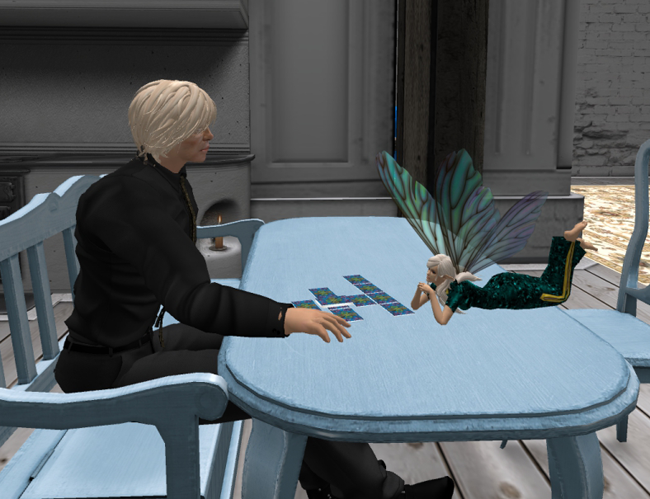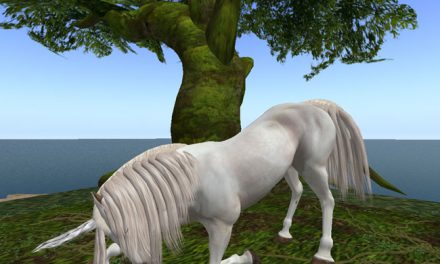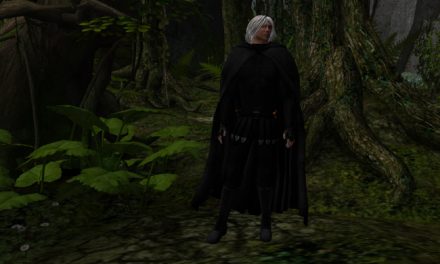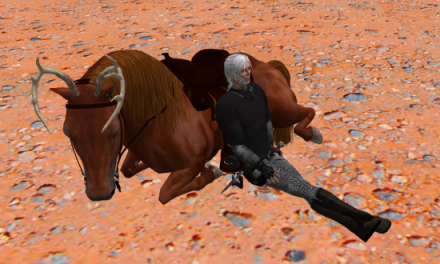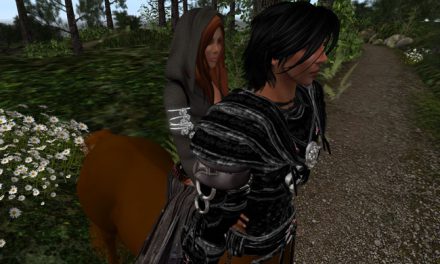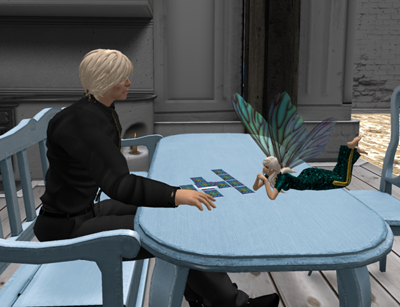 Metaphysical Therapy
Metaphysical Therapy
By
Michael H. Payne
And because Daisy had no luck at all, Mrs. Grothus clapped her hands, bounced a little in her wheelchair, and said, “Bears, Daisy, dear! I want us to be bears!”
Daisy didn’t let her smile waver, didn’t let any dark thoughts swarm into the air like gnats above her fern-green hair, didn’t let the flutter of her translucent wings stutter or shutter. “You bet, Mrs. Grothus!” she said instead as chirpily as she could manage.
Swooping to hover in front of the human’s face, Daisy bore down, squeezing her innards till her exhausted thaumisterin glands gave just enough of a twitch to cough the barest cloud of pixie dust from the pores beneath her arms. A few spins swirled the dust toward Mrs. Grothus’s nostrils, each big enough to swallow Daisy’s head, she knew from horrible experience. But she was a lot more careful now.
The old woman eagerly sucked in the dust, her eyes already clenched, and the magic of contact sparked through Daisy like a sudden gust of pins. Finally letting herself wince, she managed to direct the power in the proper sort of folding waves, and the striped wallpaper of Mrs. Grothus’s room faded around them as if the place was filling with mist.
It was the fourth bear fantasy Daisy had directed today—there’d apparently been some documentary on TV last night. So for the next half hour, she led Mrs. Grothus through mountainous meadows so they could feel the grass under their paws, sniff the wildflowers, romp through cool, clear streams, and chase each other up trees.
“The old one-two,” she and her classmates at the Oberon and Oberlin Academy had called it whenever the professors weren’t listening. The profs had just called it The Standard Method: magically manipulating human basal ganglia while stimulating their endocrine systems. Daisy had done well enough at O & O to graduate cum laude, but large mammal fantasies always wore her out: the sprites on her mother’s side of the family meant that she did much better with flying dreams.
At least Mrs. Grothus was only scheduled for the half hour. Even at that, Daisy had to bring them back to reality more quickly than she would’ve liked to stop her aching rhomboid muscles from seizing up on her completely. Not wanting to alarm her client, she managed to stifle her groan as the little room swirled back into place around them. Mrs. Grothus didn’t seem to notice, though, settled more easily in her wheelchair, her eyes still closed and a smile on her lips.
Daisy blew out the tiniest possible breath. After the Great Reconvergence had crashed the Fae and Mortal Realms back together again, both sides had had a lot of expectations for what the future might hold. It had taken almost a decade of arguing and accusations before everybody had come to understand that magic wands didn’t solve every problem, and computers didn’t, either. Certain problems, in fact, well, applying magic or science to them just made them worse.
Fortunately, some pretty smart people—Fae and human—had formed the Oberon and Oberlin Academy, and their exchange programs seemed to have gone a long way toward keeping everybody’s imaginations from running too rampant. Not that it was perfect, of course: Daisy would never forget the stories she’d heard whispered throughout the treetops of Pixiedelphia about iPods absorbing magic, or how Hostess fruit pies were actually made with fairy organ meat…
Mrs. Grothus blinked and swallowed, and Daisy could smell her lowered blood pressure, her overall decrease in inflammation and tension. “Oh, Daisy,” the old woman said with a sigh. “You’re just magical, did you know that?”
Even with all her aches, Daisy couldn’t stop a giggle. “Part of the job description, ma’am.” And now that the patient was once again responsive— “So I guess I’ll see you next Friday afternoon.”
“The Good Lord willing and the crick don’t rise,” Mrs. Grothus said the way she always did and gave Daisy a wink.
Daisy kept her wings buzzing perkily till she was out the doorway into the hall, then she drifted down to rest on top of the folded sheets piled on the metal cart parked beside Mr. Sarkissian’s room. Though the strong stink of artificial lemon told her that it probably wasn’t Mr. Sarkissian’s room any more…
Clinging to the edge of the sheets, she leaned forward till she could see Consuela expertly tucking new blankets over the bed that conspicuously didn’t have Mr. Sarkissian lying in it. With a louder sigh, Daisy made a mental note to check with Dispatch for her new Tuesday morning assignment.
Consuela’s head came up, and the human gave a narrow smile. “Hola, mija,” she said.
A mental nudge switched the language spell in Daisy’s head from English to Spanish. “Did he at least make it to see Jeopardy on Tuesday night?”
That broadened Consuela’s smile a bit. “We found him Wednesday morning. He passed in his sleep.”
Daisy nodded. “He told me he wanted his tombstone to say, ‘He asked all the right questions.'”
Another little tug at the corners of Consuela’s mouth. “You’re doing it to me, now, aren’t you?”
Looking innocent, Daisy had found, was one of her special gifts. “I’m just sitting here leaking fairy dust all over your nice, clean sheets.”
Consuela shook her head, brushed a hand over the bedclothes, and started toward the doorway. “I can feel it every time I talk to you, Daisy: more lightness in my chest, less tightness in my shoulders.” Her smile now fully formed, she towered up beside the cart, her hands on her hips. “Do you Fae eat sadness or something?”
“I wish.” Daisy made a show of rubbing the front of her rose-petal dress. “Anything to cut down on my grocery bill.”
Chuckling, Consuela took the cart’s handle and began pushing it down the hall. “So you’re only here for the paycheck?”
“That, and the glamour.” Springing to her feet, Daisy took a few mincing steps along the top of the sheet, her lips pouting and her hips swaying like some high-elf fashion model. “We Fae crave nothing but the finest things in life, after all.”
The sudden quiet behind her made Daisy glance over her shoulder, Consuela’s gaze unfocused even as she seemed fixed on the hallway ahead. “If I was a pixie…” Consuela murmured, then she shook her head, her attention shifting back as sharp as winter rain against Daisy. “This work here at the home is the hardest I’ve ever done, but it pays my kids’ tuition and lets me show them that they can be doctors or nurses or therapists when they start thinking about college. But you’re magic. You could do anything you want.”
With an effort, Daisy got her wings moving again, flittered up to Consuela’s face, and patted her cheek. “I already am.” They were just drawing up to the nurses’ station by then, so Daisy banked away, adding, “See you Monday, Consuela!” She chatted with Billie Jean, the receptionist, while levitating a pen taller than she was to sign out on the contractors’ log, and when she made for the front door, a little concentration left a sparkling trail of dust in the air behind her.
Outside, though, she shut it down—mortals loved that Tinkerbell effect, but after the week she’d had, she sure couldn’t keep it up. Fortunately, the parking lot always made some nice thermals, and she caught one that lofted her up into the spring afternoon sunlight above downtown Pacoima.
Consuela thinking she ate sadness. Daisy shook her head. They should show documentaries about the Fae instead of bears. Not that Oberon and Titania would let them, of course. Or at least, they wouldn’t let it actually tell the truth…
A shift of her shoulders directed Daisy northwestward, and sailing over Hansen Lake, she waved to a couple naiads working on the dam. The traffic streaming along the Foothill Freeway gave her another thermal boost, then the streets below her got quieter and quieter, the buildings smaller, the patches of greenery growing larger, the hills rising just ahead. Dipping into a dive, she zipped another two blocks, then pulled up to hover at the corner.
The little house seemed to shy away from the street, the way it hid behind its hedge of stubby palm trees and whatever those big elephant ear bushes were called. A nice neighborhood, the streetlights mostly working when she came by after dark, the shouting mostly coming from kids playing between the parked cars if it was before sunset, this had been her last stop every Friday since she’d started.
Flexing her wings with another wince, Daisy drifted up the driveway, down the little fern-lined passage between the house and the garage, and into Horatio’s shady patio, the sun hidden behind the tall, rustling hedge. The clock inside gave a single chime, and Horatio, sitting in the big wicker chair behind the glass-topped table in the middle of the patio, called, “Right on time, Daisy!”
“You bet!” She settled on the back of the lawn chair across the table from him and couldn’t stop an excited spray of pixie dust. Horatio wore his tuxedo, of course, and while it was a little baggy around the shoulders and the top hat sagged a little to one side, she couldn’t imagine him dressed any other way. “How’s your week been, Horatio?”
He shrugged. “Things run together.” A glint came into his eyes, the wrinkles on his face deepening when he grinned. “I always make sure to cross the day off the calendar before I go to bed, though, so I’ll know when our appointment’s coming. Wouldn’t wanna miss it, now, would I?”
“Me, neither.” She hadn’t said a more honest thing all week. Sitting forward on her perch, she let herself squeak with anticipation. “So! What’s up today?”
“Well, now.” He pressed a hand against the table, his fingers as gnarled as tree branches, and when he pulled away, a deck of cards lay there. “What would you like to be up today?”
She didn’t even have to think. “The Four Burglars!”
“Of course.” Grinning some more, he shuffled the cards and spread them face down in a long column pointing from him to her. “One night, these four burglars showed up to rob the same skyscraper without knowing the others were gonna be there. One tunneled into the basement”—he turned over the bottom card to show the Jack of Spades—”one strolled into the lobby”—he turned over the Jack of Hearts about a quarter of the way up the column—”one climbed the outside and busted in through a sixth floor window”—about three-quarters of the way along, he turned over the Jack of Clubs—”and the fourth sailed in with his hang glider and landed on the roof”—the top card, when he turned it over, was the Jack of Diamonds.
“But what they also didn’t know,” he went on, turning over four cards in the middle one at a time to show the four Kings, “was that four cops were meeting on the third floor for their weekly poker game.”
The story that followed changed every week, but it always got Daisy laughing and hollering, Horatio somehow shuffling the Jacks all over the deck with the Kings chasing them. It usually ended with the burglars getting caught, Horatio pulling each Jack out with a King on top of it, except for sometimes when the Queen of Diamonds would rescue her Jack and escape with him from the top of the deck in the hang glider.
Daisy clapped and cheered, and Horatio bowed from his chair. Then he did the one where the black and red cards got into a big argument that he tried to settle. He talked to them, tried to convince them to get along, but they shouted back in silly little voices saying that they were done working together. And no matter how many times he shuffled the deck, when he would spread it and flip it over, all the red ones would be gathered on one end with all the black ones on the other. He usually talked them into being friends again, though, and the last flip of the stack showed the cards evenly interspersed, black-red-black-red-black-red.
Then he did the one where he gave Daisy half the deck to fly over to her side of the table. She picked out a card from her half, he picked out a card from his half, and the story he told concerned two lovers kept apart by their nasty families. Again, Horatio would do all the different voices for the cards: Daisy especially loved how he played the Queen of Hearts, the sorceress the lovers appealed to for help. And even though Daisy was sitting on her cards, the one she’d chosen always vanished from her deck and appeared in his despite the whole table lying between them.
He finished up as always with her very favorite: she picked a card, and Horatio told another whole story about that card deciding to take over the deck. No matter what he did—crumpling the card up, throwing it on the ground, tearing it to pieces, even setting it on fire with a little yellow lighter—her card kept reappearing, and his reactions to it were pretty much the funniest thing ever.
And yes, she sometimes caught glimpses of things tucked up inside his sleeves, or sometimes the odd way he held one bony hand would try to make her thoughts go in certain directions. But she blinked those glimpses away, stomped those thoughts down, and let herself get lost again in the story.
The story ended with Horatio sighing, telling the card she’d won, putting her face down on top of the deck, tapping her, and turning her over to show that she’d become the Queen of Spades. By then, the sun had just about set, and Horatio looked years younger than when Daisy’d arrived. He pushed himself to his feet and bowed; she clapped and clapped, and then, even though she knew the answer, she asked, “So what can I do for you? Turn us into birds so we can go for a flight? Or kittens so we can romp around a while?”
When he shook his head, his top hat popped off, rolled down his arm into his hand, and he dropped the deck of cards into it. “You’ve already done all the magic I need, Daisy, my sweet.” Lowering himself back into his chair, he fixed those deep, dark eyes on her. “But maybe this week, you’ll tell me what’s bothering you every time you come to see me.”
She almost put on her usual sunny smile, almost gave him her little laugh and some joke about not bothering with bother. But Mr. Sarkissian’s empty bed flashed behind her eyes, Mrs. Grothus seeming to sink further and further into that wheelchair every week, and someday, she knew, she’d fly into the hills above Pacoima to find just a pack of cards sitting alone on a table. “I’m selfish, Horatio,” she muttered. And even knowing she could be sent into internal exile for continuing, she had to let him know. “I love who I am when I’m with you.”
He cocked his head. “You’re someone different everywhere else?”
Swallowing, trying to gather her thoughts, she found herself focusing on his top hat. “Do you know what separated the Fae Realm and the Mortal Realm way back when?” she asked, fluttering over to hover above it.
Horatio blinked. “I guess I heard that it just happened. A thousand years before us mortals started even thinking about being civilized, the cosmos shifted and drifted us apart or something. That’s why we had legends about you, isn’t it?”
Daisy shook her head, held her arms out, and flexed power from her no-longer-aching thaumisterin glands. “For millennia,” she said, letting the deck of cards rise over the hat’s brim and settle onto the table, “Mortals and Fae tried and tried and tried to live together.” Wiggling the strings of the universe with her fingers, she riffled the cards to show them all properly shuffled together.
“But despite everyone’s best intentions,” she went on, waving her hands like an orchestra conductor to cut the deck, shuffle it, cut it again, and shuffle it again, “the two Realms could never quite get things to work out.” She cut the deck once more, spread the two halves across the tabletop, and flipped them face up to show that one was entirely red, the other entirely black.
His applause startled her. “You’ve been paying attention,” he said.
“Eh.” She let sparks crackle from her fingertips. “When I do it, it’s just a manipulation of thaumisterin. When you do it, it’s magic.”
His confusion crisped the air against her wings; not wanting to get ahead of herself, she turned back to the cards. “When Mr. Shakespeare wrote that play four hundred years ago, all he had was the magic of his pen and his imagination. And he made something so fantastic and so creative and so true, Oberon and Titania got embarrassed and upset and deeply insulted.”
Pinching her fingers, she gathered the cards back into their two stacks. “So they cast a giant spell, one that tore the cosmos in two and made you mortals think we Fae were just things you’d made up.” A flick of her wrists sent the halves of the deck whisking off to opposite sides of the table, the red cards flipping and landing face down beneath her, the black cards face down in front of him. “We Fae didn’t need you. We were magic, and you were hardly better than animals. So good riddance, right?”
Memories made her shutter, but she kept the story going. “But some of us thought it was a mistake, and we didn’t stop saying so.” With a gesture, she flipped over the top card of her stack: the Four of Hearts. “That got us into trouble.” Half the red deck rose up, slapped down onto the Four, then moved back into place, burying the Four. “But we were determined.” The top card flipped over again, and it was the Four of Hearts. “So things got ugly.” Scissoring her index finger and middle finger, she sliced the card to shreds and summoned a wind to blow the pieces away. But the top card flipped once more to show the Four of Hearts. “Very ugly,” she managed to say, and a snap of her fingers engulfing the card in flames.
“But by then”—she flipped the whole red deck over and fanned them out to show that they were now pink instead of red—”everything in the Fae Realm had started fading. It was gradual enough that no one noticed for a while, but it turned out…it turned out that we Fae really are all in your imagination.”
Saying it out loud tightened her throat, but Horatio, the way he gave and gave and gave without ever asking for anything, she hoped he wouldn’t…knew he wouldn’t…
With a mental wrench, she forced herself back to the cards, the numbers, letters, hearts, and diamonds barely showing on the white faces. “We needed to open the way again, needed to rejoin the sundered cosmos, and with our power so diminished, we knew we’d just have the one chance.” Bringing her hands together flipped her deck face down again and restacked it beneath her. “Oberon and Titania gathered the strength of every Fae left in the Realm, added their own, and concentrated it all on the one individual who’d known from the beginning that we couldn’t survive apart from mortals.”
She dropped to the table, reached over, and physically picked up the top card, so big that when she held it up on edge in front of her, she could just peer over the red and glowing Four of Hearts. She set the card back onto the deck, tapped it, then looked over at Horatio.
He didn’t even hesitate. He tapped the deck in front of him, spread it out on the table, used one finger to flip the whole row of cards over, and there, in the middle of all the deck’s black cards, nestled the Four of Hearts. “And that,” Daisy could barely whisper, “is what we call the Great Reconvergence.”
Silence settled around them in the deepening twilight, and Daisy cleared her throat for what felt like the sixth or seventh time since she’d started talking. “So we need you mortals. We need you to be healthy and smart and imaginative, or we won’t be any of those things. And you, Horatio, you’re all of those.”
“I’m just a tired old man,” he muttered.
Daisy shook her head so violently at that, she had to jump into a hover to keep from falling off the back of the chair. “You’re a magician!” she said, swooping over to poke him in the nose. “None of us Fae could do anything if it wasn’t for people like you!” Realizing what she was doing, she pulled her hand back and lowered her voice. “You, uhh, you won’t tell anyone I said all that, will you?”
A chuckle shook his tuxedo coat. “My dear, honorable magicians never reveal each other’s secrets. But I do have a question.” He plucked the Four of Hearts from the black cards, flipped his half of the deck face down, scooped them together into a single stack, then put the Four of Hearts on top. “In the original trick, the Persistent Card gets her reward at the end.” He tapped the deck, turned over the top card, and it had become the Queen. “What, you weren’t interested?”
“Are you kidding?” Clapping her hands, Daisy buzzed over to him and dropped her stack of cards onto his. “What I’m doing is way more fun than anything Titania gets to do!” With a laugh, she planted a tiny kiss among the furrows of his wrinkles. “See you next Friday!” And she whisked away light as thistledown toward the street.
Michael H. Payne’s novels have been published by Tor Books and Sofawolf Press while his stories have appeared in Asimov’s, the Writers of the Future Contest collections, and eleven volumes of the annual Sword & Sorceress anthology. He’s been writing and drawing at least ten pages of webcomics a week for the past thirteen and a half years, and he helps curate My Little Pony fan fiction for the websites of Equestria Daily and the Royal Canterlot Library. Check www.hyniof.com for more details.
Rat’s Reputation, the sequel to my 1998 novel The Blood Jaguar, is available now from Sofawolf Press; my Amazon.com Author Page has three fantasy novels and a dozen fantasy and science-fiction short stories that appeared in places like Asimov’s SF, Marion Zimmer Bradley’s Fantasy, and Tomorrow Speculative Fiction; “Immolation,” the second Cluny story, is in the anthology What Happens Next; the rest of the Cluny stories are in the Sword & Sorceress anthologies starting with #23; “Emergency Maintenance,” a talking animal science-fiction story, can be found in the anthology The Furry Future; my 1991 novelette “Crow’s Curse,” 3rd place finisher in that year’s Writers of the Future contest, has been reprinted in the collection An Anthropomorphic Century;
“A Study in Sorrel,” a short story combining themes from both Sherlock Holmes and My Little Pony, can be found in NonBinary Review #9; and “The Precession of the Equinoxes,” a talking animal fantasy story, appears in the anthology Gods With Fur.
